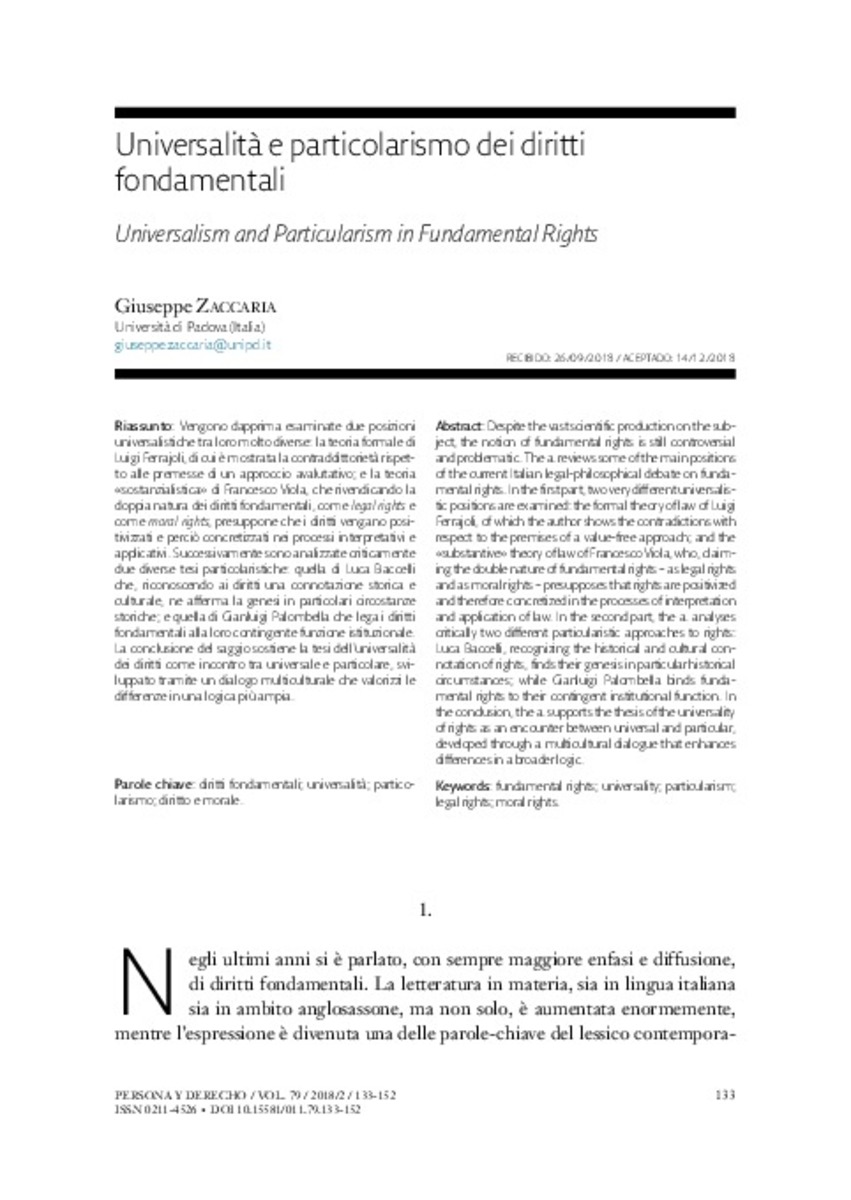Full metadata record
| DC Field | Value | Language |
|---|---|---|
| dc.creator | Zaccaria, G. (Giuseppe) | - |
| dc.date.accessioned | 2019-12-18T11:12:06Z | - |
| dc.date.available | 2019-12-18T11:12:06Z | - |
| dc.date.issued | 2018 | - |
| dc.identifier.citation | Zaccaria, Giuseppe. "Universalità e particolarismo dei diritti fondamentali". Revista Persona y Derecho. 0 (79), 2018, 133-152 | - |
| dc.identifier.uri | https://hdl.handle.net/10171/58599 | - |
| dc.description.abstract | Vengono dapprima esaminate due posizioni universalistiche tra loro molto diverse: la teoria formale di Luigi Ferrajoli, di cui e mostrata la contraddittorieta rispetto alle premesse di un approccio avalutativo; e la teoria ≪sostanzialistica≫ di Francesco Viola, che rivendicando la doppia natura dei diritti fondamentali, come legal rights e come moral rights, presuppone che i diritti vengano positivizzati e percio concretizzati nei processi interpretativi e applicativi. Successivamente sono analizzate criticamente due diverse tesi particolaristiche: quella di Luca Baccelli che, riconoscendo ai diritti una connotazione storica e culturale, ne afferma la genesi in particolari circostanze storiche; e quella di Gianluigi Palombella che lega i diritti fondamentali alla loro contingente funzione istituzionale. La conclusione del saggio sostiene la tesi dell’universalita dei diritti come incontro tra universale e particolare, sviluppato tramite un dialogo multiculturale che valorizzi le differenze in una logica piu ampia. | - |
| dc.description.abstract | Despite the vast scientific production on the subject, the notion of fundamental rights is still controversial and problematic. The a. reviews some of the main positions of the current Italian legal-philosophical debate on fundamental rights. In the first part, two very different universalistic positions are examined: the formal theory of law of Luigi Ferrajoli, of which the author shows the contradictions with respect to the premises of a value-free approach; and the ≪substantive≫ theory of law of Francesco Viola, who, claiming the double nature of fundamental rights – as legal rights and as moral rights – presupposes that rights are positivized and therefore concretized in the processes of interpretation and application of law. In the second part, the a. analyses critically two different particularistic approaches to rights: Luca Baccelli, recognizing the historical and cultural connotation of rights, finds their genesis in particular historical circumstances; while Gianluigi Palombella binds fundamental rights to their contingent institutional function. In the conclusion, the a. supports the thesis of the universality of rights as an encounter between universal and particular, developed through a multicultural dialogue that enhances differences in a broader logic. | - |
| dc.language.iso | spa | - |
| dc.publisher | Servicio de Publicaciones de la Universidad de Navarra | - |
| dc.rights | info:eu-repo/semantics/openAccess | - |
| dc.subject | diritti fondamentali | - |
| dc.subject | universalità | - |
| dc.subject | particolarismo | - |
| dc.subject | diritto e morale | - |
| dc.subject | fundamental rights | - |
| dc.subject | universality | - |
| dc.subject | particularism | - |
| dc.subject | legal rights | - |
| dc.subject | moral rights | - |
| dc.title | Universalità e particolarismo dei diritti fondamentali | - |
| dc.title.alternative | Universalism and Particularism in Fundamental Rights | - |
| dc.type | info:eu-repo/semantics/article | - |
| dc.identifier.doi | 10.15581/011.79.133-152 | - |
| dadun.citation.endingPage | 152 | - |
| dadun.citation.number | 79 | - |
| dadun.citation.publicationName | Revista-Persona-y-Derecho | - |
| dadun.citation.startingPage | 133 | - |
| dadun.citation.volume | 0 | - |
| dc.date.updated | 2019-12-18T11:12:07Z | - |
| dc.description.version | Peer Reviewed | - |
Files in This Item:
Statistics and impact
Items in Dadun are protected by copyright, with all rights reserved, unless otherwise indicated.






